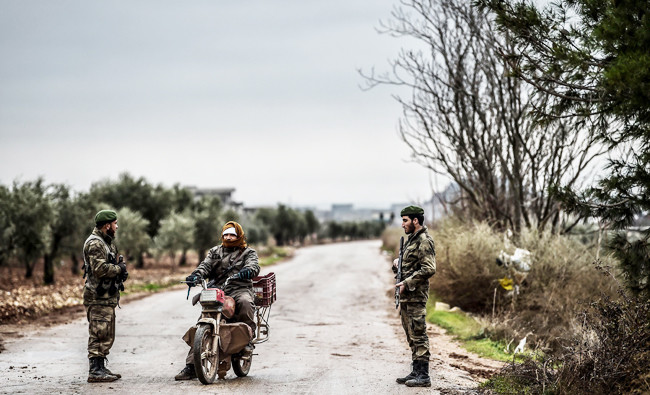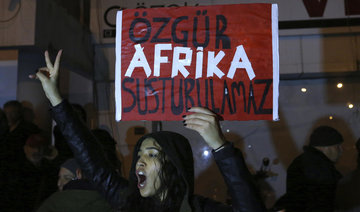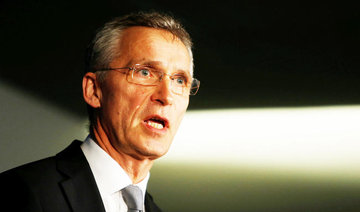ANKARA: As Turkey’s Operation Olive Branch entered its second week on Saturday, Ankara said military action against the Kurdish People’s Protection Units (YPG) militia and its political wing the Democratic Union Party (PYD) in Syria’s Afrin would continue until the threat is “neutralized.”
But despite Ankara’s claims that it has no wish to take territory from another country, and that control of Afrin will be handed over to the Syrian regime at the end of the operation, the offensive has inevitably complicated the already chaotic regional dynamics still further.
The official aim of Olive Branch is to establish stability along Turkey’s border with Syria and to remove not only the YPG/PYD — regarded by Ankara as an offshoot of the outlawed Kurdistan Workers’ Party (PKK), which has waged an insurgency against the Turkish state for more than three decades — but also Daesh from the area.
Turkey’s military reported that 343 terrorists have so far surrendered, or been killed or captured, and that 333 targets have been destroyed. The operation’s scope now extends around 7.5 kilometers into Syria, with 11 villages captured.
Turkey has lost three soldiers so far, while one Syrian refugee was killed and 13 others wounded as two rockets launched from Afrin hit the Turkish border city of Kilis on Wednesday.
No casualties were reported after another rocket struck a marketplace in the border town of Reyhanli on Friday.
Overall, the operation has garnered the approval of the Turkish public and the support of the international community, with NATO recognizing Turkey’s “right to self-defense like all other countries.”
Washington, too, has released sympathetic statements recognizing “Turkey’s security concerns about the PKK, a US-designated foreign terrorist organization.”
Russia has supported the operation by allowing Turkey access to Afrin’s airspace, although it is not yet clear whether Russia’s will allow unlimited access or whether it will impose similar restrictions to those applied during Turkey’s cross-border Euphrates Shield Operation, which ran from August 2016 to March 2017.
Washington’s offer to Ankara this week to establish a 30 km safe zone in Syria, along with an increased number of meetings between US and Turkish officials, have been seen by many experts as a move by Western powers to re-establish ties with their longtime NATO ally. But the Turkish regime remains skeptical of US offers — a sign of the current distrust between the two countries.
However, the Syrian regime considers Turkey’s operation to be an invasion and an attack to Syrian sovereignty. In an interview with the BBC on Thursday, Deputy Foreign Minister Faisal Mekdad said Syria will “act accordingly” to defend itself, explaining that could involve the use of its aerial defense systems.
Also on Thursday, the PYD/YPG-led administration of Afrin canton released a statement calling on Bashar Assad and his regime to protect the city.
Erol Bural, a former military officer and a terrorism expert at the 21st Century Turkey Institute, said the Turkish military, with the assistance of Free Syrian Army fighters, had encircled Afrin by opening multiple front lines.
“Barseya mountain, in the north of Azaz, is a primary target for Turkey because of its critical location overlooking Afrin’s urban center. The PKK/PYD used it as a major hideout for years, with fortifications against aerial and ground attacks,” Bural told Arab News.
Bural expects an effective siege on Afrin’s urban center once this mountain has been cleared of any terrorist threat, which will also prevent the YPG from targeting Turkey’s border towns with rockets and mortars.
“I don’t expect the Syrian regime to react positively to the YPG’s call, considering that Assad previously called the US-backed Kurdish fighters traitors, and considering the regime also wants the PYD presence cleaned out from this region,” he said.
At the end of the operation’s first week, the expansion of Olive Branch to Manbij, a city captured from Daesh in 2016 by the Kurdish militias, is still on the table. But the presence of American forces there complicates the situation.
“I think the main focus for now should be to wind up the military operation and hand complete control to local forces, while conducting diplomacy with regional actors,” Bural said.
According to Bural, the US is holding Manbij as its “trump card” against Turkey, in an attempt to weaken Russia’s influence on Ankara and to protect the “PKK statelet” America has established on the western flank of the River Euphrates.
“Now Turkey has two options: Either launch an operation on Manbij regardless of the US military presence, or conduct diplomatic maneuvers to convince the US to withdraw their soldiers,” he said.
According to Galip Dalay, research director at Al-Sharq Forum in Istanbul, “Operationally, the Afrin operation is progressing slowly but smoothly.”
Dalay thinks Operation Olive Branch is unlikely to progress at the same speed as Euphrates Shield, “at least in its early phases.”
“Nevertheless, Turkey hasn’t incurred many casualties,” he told Arab News.
On the diplomatic front, despite US concerns, the international community has so far been supportive of the operation, he said, adding that the objections it has faced thus far are “manageable.”
On the political front, though, Dalay said the goal of the operation “is still opaque.”
He explained: “It isn’t clear yet what will be acceptable to Turkey in Syria. If Turkey keeps the pressure on the YPG for too long, the YPG will invite the Assad regime to Afrin.
“Despite Turkey’s public discourse, Turkey doesn’t have much objection to such an outcome,” he continued. “Nevertheless, that would bode ill for Turkey, as well as the Syrian opposition’s image, as their actions will appear to play into the hands of the regime. This is one of the major dilemmas of this operation.”
One week on, Operation Olive Branch helps Turkey seize many initiatives
One week on, Operation Olive Branch helps Turkey seize many initiatives

French ministers in Lebanon for talks month into Israel-Hezbollah truce

Foreign Minister Jean-Noel Barrot and Defense Minister Sebastien Lecornu met with Lebanon’s army chief Joseph Aoun, and on Tuesday are due to visit UN peacekeepers near the Israeli border.
A Lebanese army statement on social media said that Aoun and the visiting ministers discussed “ways to strengthen cooperation relations between the armies of the two countries and to continue support for the army in light of current circumstances.”
Aoun, who is being touted as a possible candidate for Lebanon’s president, has been tasked with deploying troops in the south of the country since the Israel-Hezbollah ceasefire came into effect on November 27.
Lecornu said on X that he is also due to meet with a French general representing Paris “within the ceasefire monitoring mechanism.”
“Our armies are, and will remain, committed to the stability of Lebanon and the region,” he said.
The monitoring body brings together Lebanon, Israel, the United States, France and the United Nations’ UNIFIL peacekeeping mission. It is meant to support the implementation of the ceasefire and assess violations.
On Thursday, UNIFIL said it was “concerned” by “the continued destruction” carried out by the Israeli army in southern Lebanon, despite the truce.
Lecornu and Barrot are scheduled to meet on Tuesday with French soldiers deployed with UNIFIL in south Lebanon.
Israel must face consequences over Gaza campaign: UN experts

- “Israel continues to face no real consequences, largely due to protection offered by its allies”
- Israel has killed more than 45,500 people in Gaza, a majority of them civilians, according to figures from the Hamas-run territory’s health ministry that the UN considers reliable
- The experts highlighted alleged crimes against humanity committed by Israel “including murder, torture, sexual violence, and repeated forced displacement amounting to forcible transfer”
GENEVA: United Nations rights experts on Monday said Israel must face the consequences of “inflicting maximum suffering” on Palestinian civilians in Gaza, alleging Israel was defying international law and being sheltered by its allies.
“International humanitarian law comprises a set of universal and binding rules to protect civilian objects and persons who are not, or are no longer, directly participating in hostilities and limits permissible means and methods of warfare,” the 11 experts said in a joint statement.
“Rather than abide by these rules, Israel has openly defied international law time and again, inflicting maximum suffering on civilians in the occupied Palestinian territory and beyond.
“Israel continues to face no real consequences, largely due to protection offered by its allies.”
The Gaza war was triggered by the Hamas-led October 7, 2023, attack on Israel.
That resulted in 1,208 deaths, mostly civilians, according to an AFP tally of Israeli official figures.
Israel’s retaliatory military campaign has killed more than 45,500 people in Gaza, a majority of them civilians, according to figures from the Hamas-run territory’s health ministry that the UN considers reliable.
The experts highlighted alleged crimes against humanity committed by Israel “including murder, torture, sexual violence, and repeated forced displacement amounting to forcible transfer.”
They also noted alleged war crimes including “indiscriminate attacks on civilians and civilian objects... the use of starvation as a weapon of war” and “collective punishment.”
They said civilians were protected persons and did not constitute military objectives under international law.
“Acts aimed at their destruction in whole or in part are genocidal,” they added.
The experts called for urgent, independent and thorough investigations into alleged serious violations of international law.
“Israel’s continued impunity sends a dangerous message... Israel and its leaders must be held accountable,” they said.
The experts said they were particularly alarmed by Israel’s operations in the northern Gaza Strip.
Since October 6 this year, Israeli operations in Gaza have focused on the north, with officials saying their land and air offensive aims to prevent Hamas from regrouping.
“This siege, coupled with expanding evacuation orders, appears intended to permanently displace the local population as a precursor to Gaza’s annexation,” the experts said.
UN rights experts are independent figures mandated by the Human Rights Council. They do not therefore speak for the United Nations itself.
The 11 experts included the special rapporteurs on internally displaced persons; cultural rights; education; physical and mental health; arbitrary executions; the right to food; and protecting rights while countering terrorism.
Francesca Albanese, the special rapporteur on the rights situation in the occupied Palestinian territories, was also among the experts.
Israel has demanded her removal, branding her a “political activist” abusing her mandate “to hide her hatred for Israel.”
Two killed in Gaza as aid convoy looted: WFP

- WFP said “coordinated movement to bring in 40 trucks on behalf of humanitarian partners” Sunday “was faced with violent, armed looting, resulting in the deaths of two”
GAZA STRIP: Two people have been killed in northern Gaza as gunmen attacked an aid convoy, the World Food Programme said Monday, prompting Hamas to accuse to UN agency of having failed to coordinate security.
Gazans face dire conditions after nearly 15 months of war, triggered by Hamas’s October 7, 2023 attack on Israel, with humanitarian agencies repeatedly warning not enough aid was reaching Palestinians in need due in part to looting as well as Israeli restrictions.
The World Food Programme (WFP) said in a statement that “a coordinated movement to bring in 40 trucks on behalf of humanitarian partners” on Sunday “was faced with violent, armed looting, resulting in the deaths of two.”
“Amidst the armed looting, five trucks of commodities were lost,” it added.
Hamas, the Palestinian group that runs the Gaza Strip, said in a statement that “a catastrophic mistake” by the WFP “claimed the lives of two citizens and injured dozens with bullets.”
“We hold it fully responsible and demand that it not violate the protocol followed regarding coordination to secure aid trucks,” the statement said.
The WFP said in its statement that for the past two weeks, “nearly every movement of aid through crossings in south and central Gaza has resulted in violence, looting and tragic deaths due to attacks and the absence of law and order along convoy routes inside Gaza.”
The organization said that it was still following “procedures of coordination set in place in previous months” and that it had “repeatedly warned of the dangers of movement in the absence of law and order” in the Palestinian territory.
For months, both Israel and aid agencies including the WFP have noted widespread looting by armed gangs, as well as civilians desperate for supplies.
Humanitarian agencies also say the delivery routes they take through Gaza are sometimes blocked by Israeli military activity.
Aid organizations have repeatedly warned of the deteriorating conditions in Gaza, saying civilians are starving and that aid shipments in recent months have been lower than at any time during the war.
East Africa’s IGAD envoy to visit Sudan

- Visit comes a year after the government in Sudan froze relations with the regional bloc and suspended its membership of the body
NAIROBI: The East African bloc bloc’s Intergovernmental Authority on Development envoy to Sudan said Monday he planned a visit to the war-torn country next month where he is trying to act as a mediator. It comes a year after the government in Sudan froze relations with the regional bloc and suspended its membership of the body.
Sudan has been mired in a brutal conflict since April last year, with the paramilitary Rapid Support Forces under Mohamed Hamdan Dagalo — commonly known as Hemeti — fighting the Sudanese Armed Forces, led by Abdel Fattah Al-Burhan.
IGAD had repeatedly attempted to mediate between the two warring generals, but to no avail.
In January, the bloc invited Dagalo to a summit in Uganda, prompting a furious response from the Foreign Ministry in the army-aligned government.
It accused IGAD of “violating Sudan’s sovereignty” and setting a “dangerous precedent,” saying it would suspend its membership of the bloc.
IGAD special envoy to Sudan Lawrence Korbandy confirmed on Monday that a visit to Port Sudan was planned in the new year. “I’m visiting them to talk to them about issues related to peace in that country,” he said from Nairobi, declining to give details over who he might meet.
Korbandy said the visit had been scheduled for December before being postponed to January. He labeled the suspension a “minor problem” — noting that Sudan was a founding member of the regional body — and said the proposed visit was “absolutely” a positive step.
“I’m looking for constructive dialogue regarding the peace in Sudan, and most importantly is the return of Sudan’s activities in IGAD,” he added.
“My mandate is to bring peace to the Sudanese people, and there is no other way, only to talk to all the parties in this conflict.”
More than half of Syrian children out of school: Save the Children to AFP

- Overwhelming majority of Syrian children also in need of immediate humanitarian assistance including food
DAMASCUS: About half of school-age children in Syria are missing out on education after nearly 14 years of civil war, Save the Children told AFP on Monday, calling for “immediate action.”
The overwhelming majority of Syrian children are also in need of immediate humanitarian assistance including food, the charity said, with at least half of them requiring psychological help to overcome war trauma.
“Around 3.7 million children are out of school and they require immediate action to reintegrate them in school,” Rasha Muhrez, the charity’s Syria director, told AFP in an interview from the capital Damascus, adding “this is more than half of the children at school age.”
While Syrians have endured more than a decade of conflict, the rapid rebel offensive that toppled president Bashar Assad on December 8 caused further disruption, with the UN reporting more than 700,000 people newly displaced.
“Some of the schools were used as shelters again due to the new wave of displaced people,” Muhrez told AFP.
The war, which began in 2011 after Assad’s brutal crackdown on anti-government protesters, has devastated Syria’s economy and public infrastructure leaving many children vulnerable.
Muhrez said “about 7.5 million children are in need of immediate humanitarian assistance.”
“We need to make sure the children can come back to education, to make sure that they have access again to health, to food and that they are protected,” Muhrez said.
“Children were deprived of their basic rights including access to education, to health care, to protection, to shelter,” by the civil war, but also natural disasters and economic crises, she said.
Syria’s war spiralled rapidly from 2011 into a major civil conflict that has killed more than 500,000 people and displaced millions.
More than one in four Syrians now live in extreme poverty according to the World Bank, with the deadly February 2023 earthquake bringing more misery.
Many children who grew up during the war have been traumatized by the violence, said Muhrez.
“This had a huge impact, a huge traumatic impact on them, for various reasons, for losses: a parent, a sibling, a friend, a house,” she said.
According to Save the Children, around 6.4 million children are in need of psychological help.
Muhrez also warned that “continued coercive measures and sanctions on Syria have the largest impact on the Syrian people themselves.”
Syria has been under strict Western sanctions aimed at Assad’s government, including from the United States and European Union, since early in the war.
On Sunday, Syria’s de facto leader Ahmed Al-Sharaa expressed hope that the incoming administration of US President-elect Donald Trump would lift sanctions.
“It’s very difficult for us to continue responding to the needs and to reach people in need with limited resources with these restrictive measures,” she said.



















